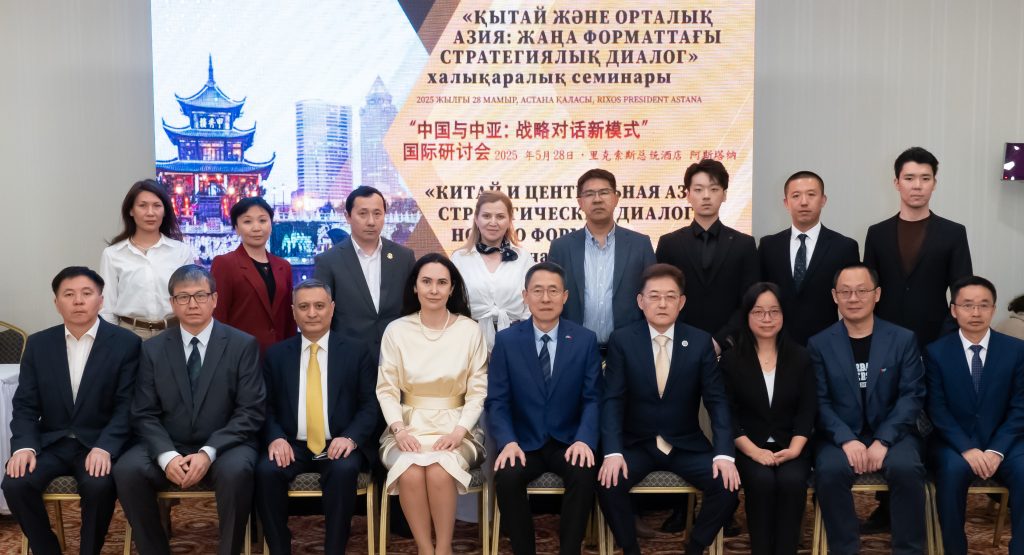
On May 28, 2025, the international seminar “China and Central Asia: Strategic Dialogue of a New Format,” held in Astana, became a significant event on the regional expert and diplomatic agenda. Taking place ahead of the second China–Central Asia Summit, the event confirmed the readiness of key players to develop long-term cooperation formats based on mutual respect, sovereignty, and strategic trust.
Gulnar Shaimergenova, Director of the China Studies Center, emphasized that the format goes far beyond traditional diplomacy, highlighting the maturity and independence of Central Asian countries ready to engage in strategic, equitable, and pragmatic dialogue with China. She noted Kazakhstan’s special role, under the leadership of President Kassym-Jomart Tokayev, in advancing integration initiatives. “The China–Central Asia format is a living embodiment of a community of shared future, where mutual respect, sovereignty, inclusiveness, and the alignment of national interests come to the fore,” Shaimergenova stressed.
H.E. Han Chunlin, Ambassador Extraordinary and Plenipotentiary of the People’s Republic of China to Kazakhstan noted in his speech that China highly appreciates the China-Central Asia mechanism, created five years ago, which in a short time has become a sustainable platform for political dialogue, economic cooperation and humanitarian exchanges. Emphasizing the results achieved since the first summit in Xi’an, Mr. Ambassador noted the strengthening of the institutional framework, the launch of new platforms, the secretariat and the business council, as well as record trade turnover, which in 2024 reached 94.8 billion US dollars – more than twice as much as at the start of the mechanism. Particular attention in his speech was paid to the fact that China intends to consistently deepen cooperation with Central Asia, focusing on the development of infrastructure, green technologies, digital solutions, artificial intelligence, as well as humanitarian exchanges, youth and educational initiatives. At the same time, good-neighborliness, mutual respect, solidarity and equality remain the key principles. These principles, according to Mr. Ambassador, will form the basis for the upcoming second summit in Astana, where a new roadmap for joint development will be defined.
An important part of the speech was emphasizing the special nature of relations between China and Kazakhstan – “eternal comprehensive strategic partnership”. In the conditions of geopolitical instability, China sees Kazakhstan as a priority area of its diplomacy, is ready to strengthen support on key issues, promote joint prosperity and build a community of common destiny. Under the strategic leadership of Xi Jinping and Kassym-Jomart Tokayev, the parties are ready to implement large-scale initiatives and projects, strengthening long-term stability and integration in the region, concluded Mr. Ambassador Han Chunlin.
Sanjar Valiev, Director of the Center for Foreign Policy Studies of Uzbekistan, highlighted the importance of aligning national, economic, and transport strategies to strengthen regional resilience, pointing to growing trade volumes, the development of transport corridors, and major infrastructure projects.
Zhao Xiaojia, Vice President of Ningxia University, emphasized Kazakhstan’s unique role as the birthplace of the Belt and Road Initiative, noting that humanitarian, educational, and technological exchanges lay the foundation for long-term cooperation.
Erkin Baidarov of the R.B. Suleimenov Institute of Oriental Studies highlighted Xinjiang’s role as a logistical and industrial hub connecting China with Central Asia, while Jamila Eleusizova, Chair of the Association of Chinese University Alumni in Kazakhstan, stressed the decisive role of youth exchanges and digital initiatives in preparing a new generation of leaders.
Jamila Eleusizova, Chair of the Association of Chinese University Alumni in Kazakhstan, focused on the youth dimension of cooperation, noting that exchanges, internships, and digital projects are shaping a new generation of leaders capable of working in a highly technological and globalized environment.
Professor Yanwei Wang of Nazarbayev University delivered an insightful presentation on advanced hydrogen storage solutions as a key driver for developing green energy in Central Asia. He explained the strategic importance of hydrogen production and storage technologies and cited large-scale projects by Energy China as examples of the region’s promising role in the global hydrogen economy. “Central Asia’s rich solar and wind resources, vast territories, and strategic location between China and Europe position it as a future leader,” Wang emphasized.
Ulan Nukan, expert at the China Studies Center, pointed to educational projects, including Luban Workshops and joint research programs, as drivers of workforce modernization, while specialist in European and international studies Eldaniz Guseynov underscored that institutionalization — the creation of a China–Central Asia Secretariat, permanent working groups, and strategies up to 2050 — guarantees strategic sustainability.
A symbolic conclusion to the seminar was the signing of a memorandum of cooperation between the Center for Foreign Policy Studies of Uzbekistan and the China Studies Center, cementing the importance of expert and academic dialogue as a cornerstone of strategic partnership.
Thus, the Astana seminar was not only an exchange of ideas but a concrete step confirming the readiness of Central Asia and China to jointly build integration processes based on trust, alignment of interests, and sustainable development.
China Studies Center
